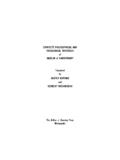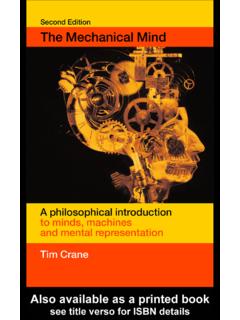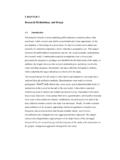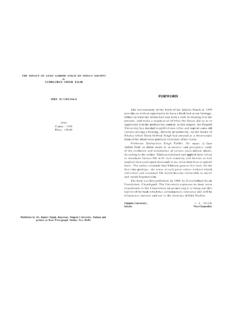Transcription of Research Paradigms and the Philosophical Trinity
1 Research Paradigms , the Philosophical Trinity , and Methodology by Graham Durant-Law BSc, MHA, MKM, Grad Dip Def, Grad Dip Mngt, Grad Cert Hlth Fin, psc. Copyright Graham Durant-Law Presentation Objectives z Outline a reasoning process that leads to the selection of a methodology that ensures alignment between the: researcher's belief system, Research paradigm , and Research methodology. z Introduce the idea of the Philosophical Trinity .'. z To make explicit my Philosophical posture. Copyright Graham Durant-Law 2. Research Paradigms Theories are nets to catch what we call the world': to rationalise, to explain, and to master it. We endeavour to make the mesh ever finer and finer.
2 Sir Karl Popper, 1902 1995, Austrian Philosopher Copyright Graham Durant-Law What is a paradigm ? z According to Kuhn there are two essential qualities of a paradigm : First the paradigm must be sufficiently unprecedented to attract an enduring group away from competing modes of scientific activity' (Kuhn 1962, p. 10); and Second sufficiently open-ended to leave all sorts of problems for the redefined group of practitioners to resolve'. (Kuhn 1962, p. 10). z Broadly there are two Paradigms available to a researcher quantitative and qualitative. Copyright Graham Durant-Law 4. Distinguishing Factors z In both Paradigms Research is distinguished from private study by the requirement to have an impact on an audience other than oneself.
3 Z The Paradigms are further distinguished from consultancy work by the obligation to make rigorous and defensible additions to a body of knowledge, rather than to solve an immediate problem. z This means that each Research paradigm of necessity has a preoccupation with theory, and particularly with the Philosophical Trinity ' of theory. Copyright Graham Durant-Law 5. The Philosophical Trinity In philosophy, however, we are concerned not with what belongs exclusively to the past or the future, but with that which is, both now and eternally in short with reason. Georg Hegel, 1770-1831, German Philosopher Copyright Graham Durant-Law The Essential Questions z The questions: What exists?
4 ', How do I know?', and 3?s What is valuable?'. together form the Philosophical Trinity . z Each is a Philosophical discipline in its own right. Copyright Graham Durant-Law 7. Ontology z Ontology is the philosophy of the world view, or weltanschauung' of reality (Heron & Reason 1997;. Hitchins 1992). z The seminal ontological question for a researcher is - Is there a real world out there that is independent of our knowledge of it?'. z The answer to this question firmly positions the researcher into one of two schools - the essentialist or foundationalist school, or the anti-foundationalist school. Copyright Graham Durant-Law 8. Epistemology z Epistemology is the philosophy of knowledge and justification (Audi 2000).
5 Z The seminal epistemological question for a researcher is - Can real or objective relations between social phenomena be identified, and if so how?'. z The answer to this compound question positions the researcher into one of three schools idealists, empericists, or realists. Copyright Graham Durant-Law 9. Axiology z Ontology and epistemology deal with truth, however axiology is about values and ethics (Mingers 2003). z The seminal axiological question for a researcher is - What is the ultimate purpose of the inquiry?'. z The first position is valuing knowledge for its own sake and as an end in itself: this is the Aristotelian School (Heron & Reason 1997). z The second position values knowledge as a means to inform, transform, or enable positive change: this might be called the Applied School'.
6 Copyright Graham Durant-Law 10. The Trinity Applied z The quantitative Research paradigm typically has an essentialist ontology, empiricist epistemology, and either an Aristotelian or applied axiology. z The qualitative Research paradigm characteristically has an anti-foundationalist ontology, a realist or idealist epistemology, and an applied or Aristotelian axiology. The realist epistemology in this paradigm gives rise to the constructivist Research tradition, and the idealist epistemology results in the subjectivist tradition of inquiry. Copyright Graham Durant-Law 11. Philosophical Alignment z The researcher is seeking to maximise the overlap between the ontological, epistemological and axiological positions.
7 Z Philosophical alignment leads to another Trinity : the alignment between the researcher's belief system, the Research paradigm , and the Research methodology. Copyright Graham Durant-Law 12. Methodology It is a capital mistake to theorise before you have all the evidence. It biases the judgment. Sir Arthur Conan Doyle, 1859-1930, Scottish Writer. Copyright Graham Durant-Law What is Methodology? z Methodology is defined as: a generic combination of methods that is commonly used as a whole as in soft systems methodology, strategic options development and analysis, or survey methodology covering the design and analysis of questionnaires (Mingers 2003, p. 559).'. z The seminal question of a methodology is - How can a researcher discover whatever they believe can be known (Guba & Lincoln 1998)?
8 '. Copyright Graham Durant-Law 14. Methodology Rich Picture Methods (procedures, tools Philosophy and techniques). + = Methodology Copyright Graham Durant-Law 15. Methodology Attributes z Hitchins (1992, p. 225) says the seven essential attributes of a methodology are: it applies to any system;. is simple;. is comprehensive;. is creative and innovative;. is for individual and team use;. is supported by tools and methods; and is proven in practice. Copyright Graham Durant-Law 16. Methodology and the Trinity z Alignment of the Philosophical Trinity provides the desired logic attributes of the methodology. z Ideally the researcher will align their own belief system (the Philosophical Trinity ), with the Research paradigm , and the Research methodology to be employed.
9 Z In order to justify the methodology, and to make rigorous and defensible additions to a body of knowledge, the researcher must make explicit their views on the Philosophical Trinity . Copyright Graham Durant-Law 17. My Philosophical Posture I shall certainly admit a system as empirical or scientific only if it is capable of being tested by experience. Sir Karl Popper, 1902 1995, Austrian Philosopher Copyright Graham Durant-Law Anti-Foundationalist Ontology z All social phenomena are socially constructed and as such must be positioned in time, space and culture. z Some social phenomena can be decomposed to smaller components, providing they are positioned in time, space and culture.
10 Z Real properties are emergent depending on where the system boundary is drawn. Copyright Graham Durant-Law 19. Realist Epistemology z Knowledge is both created and constructed by an individual within a social and cultural system located in time and space. z Individuals can share socially constructed knowledge. z Knowledge is therefore both material and immaterial. Copyright Graham Durant-Law 20. Applied Axiology z Knowledge is actually information in action and therefore is already being applied to a situation. z Little point in understanding for the sake of understanding. z Knowledge is and must be purposeful! Copyright Graham Durant-Law 21. Research Tradition Alignment z This Philosophical posture clearly leads to a constructivist tradition qualitative Research paradigm .







